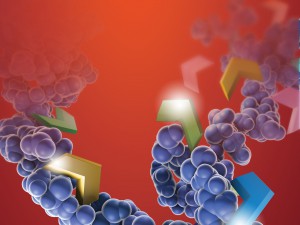
While many proteases are used in bottom-up mass spectrometric (MS) analysis, trypsin (4,5) is the de facto protease of choice for most applications. There are several reasons for this: Trypsin is highly efficient, active, and specific. Tryptic peptides produced after proteolysis are ideally suited, in terms of both size (350–1,600 Daltons) and charge (+2 to +4), for MS analysis. One significant drawback to trypsin digestion is the long sample preparation times, which typically range from 4 hours to overnight for most protocols. Achieving efficient digestion usually requires that protein substrates first be unfolded either with surfactants or denaturants such as urea or guanidine. These chemical additives can have negative effects, including protein modification, inhibition of trypsin or incompatibility with downstream LC-MS/MS. Accordingly, additional steps are typically required to remove these compounds prior to analysis.
To shorten the time required to prepare samples for LC-MS/MS analysis, we have developed a specialized trypsin preparation that supports rapid and efficient digestion at temperatures as high as 70°C. There are several benefits to this approach. First, proteolytic reaction times are dramatically shortened. Second, because no chemical denaturants have been added, off-line sample cleanup is not necessary, leading to shorter preparation times and diminished sample losses.
The Rapid Digestion trypsin protocols are highly flexible. They can accommodate a variety of additives including reducing and alkylating agents. There are no restrictions on sample volume or substrate concentrations with these kits. Furthermore, the protocol is simple to follow and requires no laboratory equipment beyond a heat block. Digestion is achieved completely using an in-solution approach, and since the enzyme is not immobilized on beads, the protocol does not have strict requirements for rapid shaking and off-line filtering to remove beads.
Are you looking for proteases to use in your research?
Explore our portfolio of proteases today.
In addition to the benefits of this flexibility, we also developed a Rapid Digestion–Trypsin/Lys-C mixture. Like the Trypsin/Lys-C Mix previously developed to prepare maximally efficient proteolytic digests, particularly for complex mixtures, Rapid Digestion–Trypsin/Lys C is ideally suited for studies that require improved reproducibility across samples.
